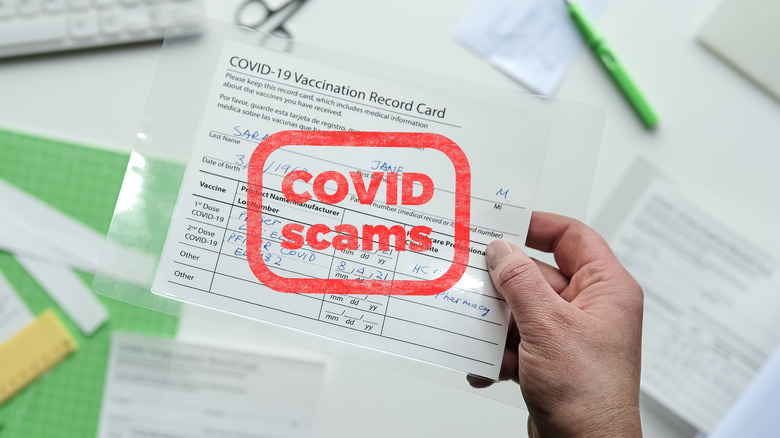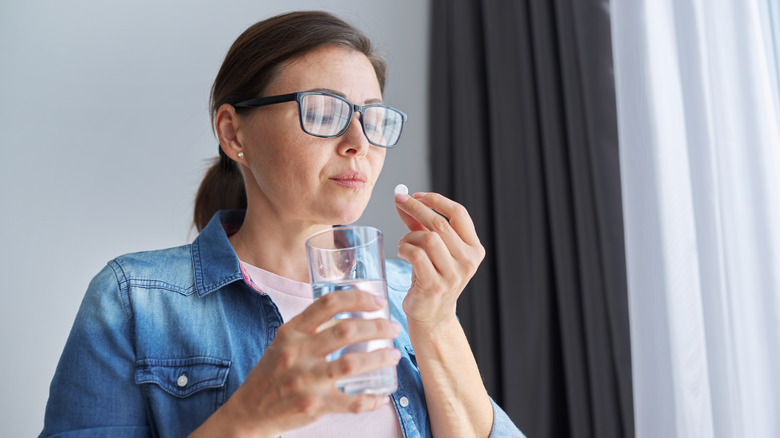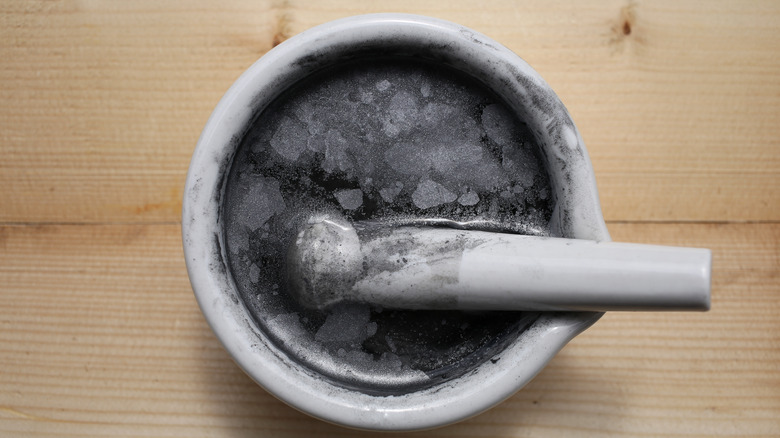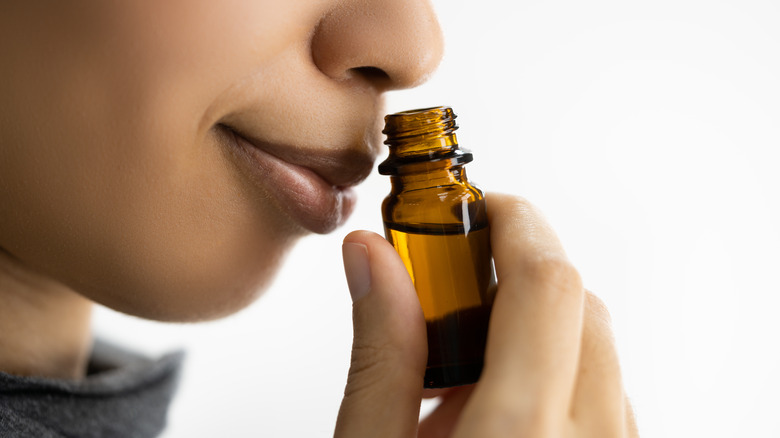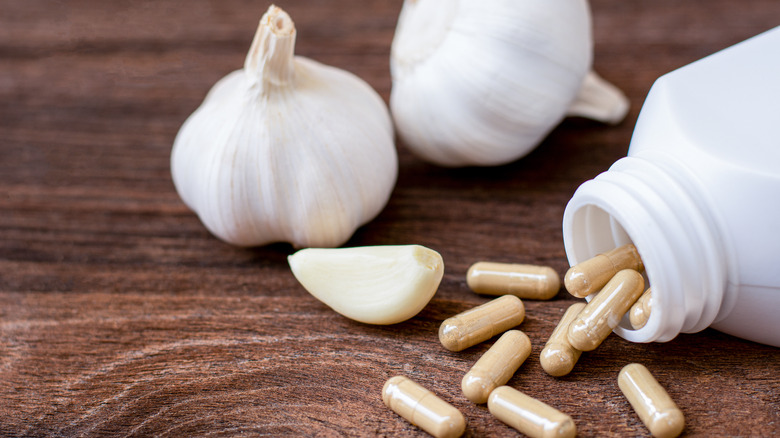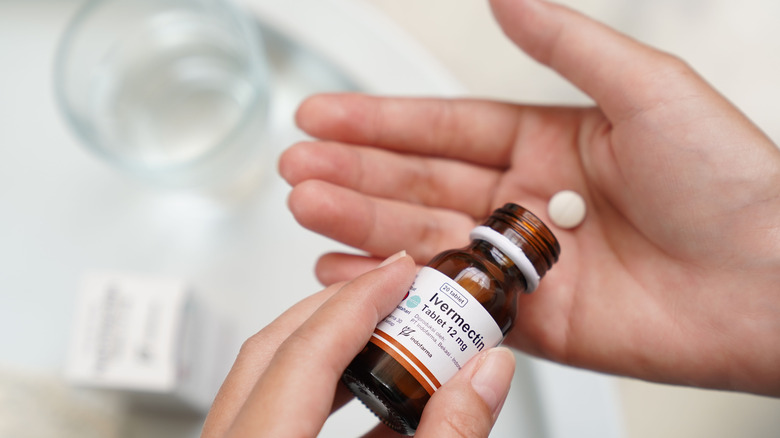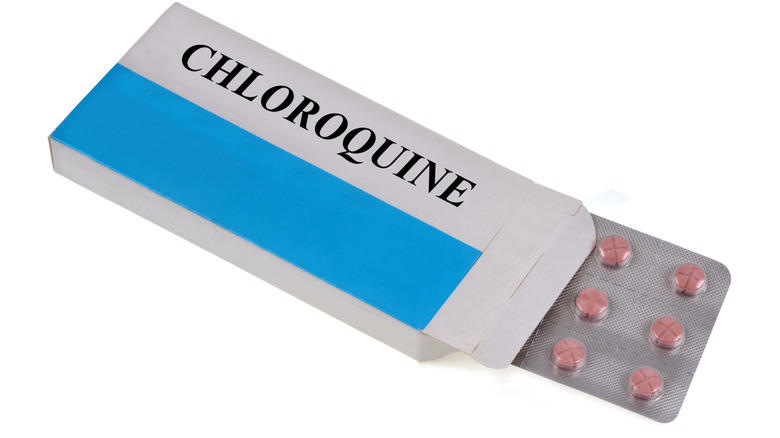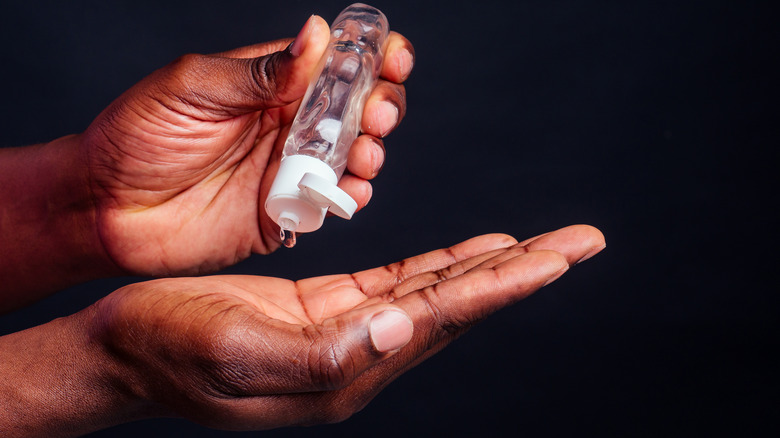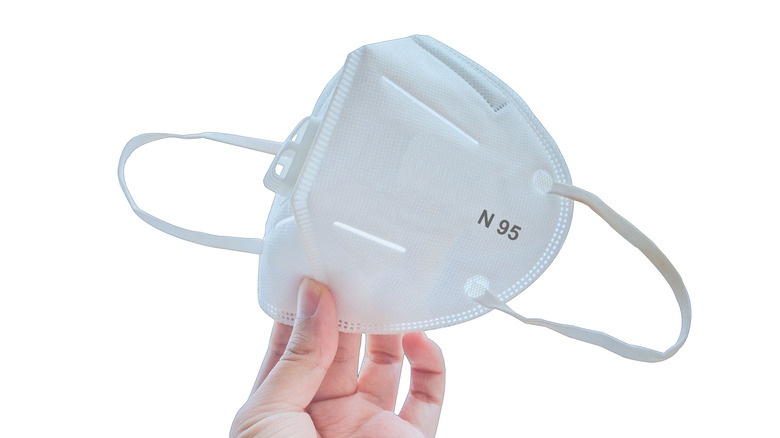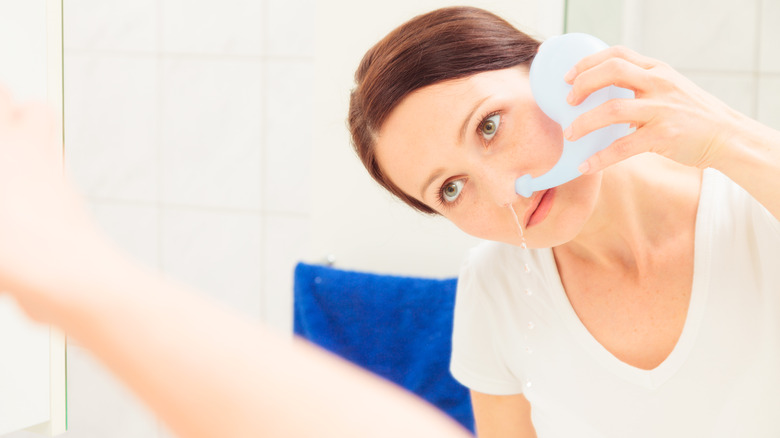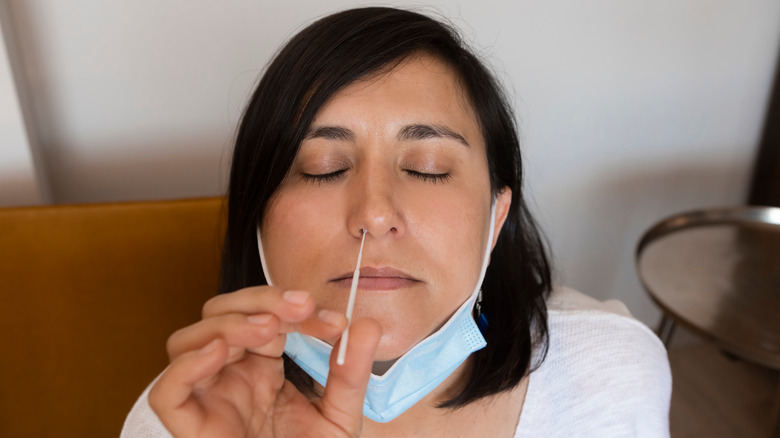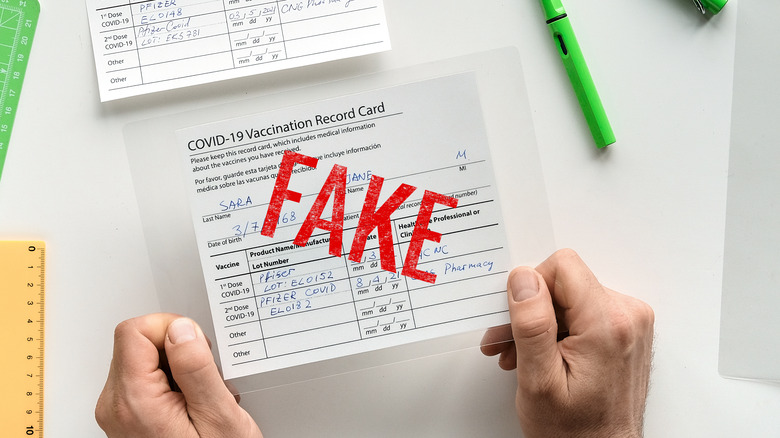Health Products For COVID-19 That Are Total Scams
"There's a sucker born every minute," history credits P.T. Barnum as having said. It's not the kindest statement, but the sober truth about human nature is that we — unlike the animals of the wild — are trusting by default. It may have something to do with the fact that our well-developed cognitive abilities allow us to engage in "wishful trusting."
Fast forward long past the first-ever handshake — fueled by trust, of course — and continuing well past the good-natured mass-trickery of 1938's "The War of the Worlds," and straight over to the COVID-19 pandemic. However, you don't have to be a "sucker" to fall for claims that a certain product or service could protect you from COVID-19. After all, who doesn't want to believe that there's a way to stay protected without the need for needles and quarantines? It's this wistfulness that makes us human.
Of course, it's that wistfulness that also makes us vulnerable to scams. And while there will always be scams, this current COVID-19-related scam landscape is particularly treacherous, with more questionable products and services than ever before. The FDA is well-aware of this and has put would-be scammers on notice that it is "actively monitoring" for fraudulent COVID-19-related health products. Just to give you a taste of the lengths to which these fraudsters will go, here's a sampling of COVID-19 health products that are nothing but scams.
Dietary supplements
You are what you eat, right — but vitamins and supplements can pick up some of the slack. That's why we have them. What vitamins and supplements are not able to do is to prevent or cure COVID-19. Or, as the National Institutes of Health Office of Dietary Supplements put it, albeit with a bit more oomph: "Data are insufficient to support recommendations for or against the use of any vitamin, mineral, herb or other botanical, fatty acid, or other dietary supplement ingredient to prevent or treat COVID-19." To put it another way still, medical science has yet to offer proof that anything that you can buy over-the-counter is going to make one iota of difference in whether or not you contract COVID-19, or how severely you will be affected if you do.
It's important to note that despite the fact that both zinc and vitamin C are scientifically known to help to prevent and ease symptoms of the common cold (which, like COVID-19, is caused by a virus), neither has demonstrated any preventative or curative powers with respect to COVID-19, even in a clinical trial, according to Harvard Health Blog. Based on the state of current medical knowledge, if a particular supplement is being marketed as prevention or treatment of COVID-19, then it is not legit.
Colloidal silver
On June 22, 2021, televangelist Jim Bakker and his church agreed to pay $156,000 as part of a lawsuit. The money serves as restitution for members of Bakker's Missouri congregation and other consumers who paid for the "Silver Solution," which Bakker had been selling as a treatment for COVID-19 via his streaming programming (via The Garden Island). "Totally eliminate it, kills it. Deactivates it," was the specific language used in the hard-sell for this colloidal silver product (colloidal silver refers to silver particles in a liquid). In addition, this treatment was claimed to have been "government-proven." However, there is no scientific evidence whatsoever that ingesting silver can prevent or treat COVID-19.
Similarly, the FDA issued a cease and desist order in March 2020 to the makers and sellers of Vital Silver, another colloidal silver tincture that claimed it "kills coronaviruses." Although the brand altered its marketing terms, the product remains on the market.
Aromatherapy
Supplements won't keep you from getting or becoming very ill with COVID-19 (via National Institutes of Health Office of Dietary Supplements). Knowing that, it probably won't entirely surprise you that aromatherapy products marketed as COVID-19 preventatives or cures are scams. Although aromatherapy products, which are made from essential oils derived from plants can be used to "make a positive impact on your health and well-being as long as you use them in a safe way," according to Johns Hopkins Medicine, there is no scientific evidence to even suggest that aromatherapy products can interfere with the spread of the novel coronavirus that causes COVID-19, nor that such products can in any way treat or cure COVID-19.
"Essential oils have long been known to have anti-inflammatory, antioxidant, immunomodulatory, and antiviral properties," wrote the authors of a 2020 research paper published in the journal, Inflammopharmacology. "However, the existing information about these essential oils is very preliminary and the majority of claims are based on data obtained from computer-aided docking and preliminary in vitro studies." In other words, aromatherapy is not a proven treatment or preventative for any illness, let alone COVID-19. Some of the aromatherapy products the FDA has already been cracking down on include the respective aromatherapy products sold by GuruNanda and Quinessence Aromatherapy.
Garlic and garlic supplements
All over the internet, you'll see claims that various foods and retail food products have the power to "fight COVID." It is true that a healthy diet is important for fighting off illnesses. In fact, the World Health Organization makes a point of emphasizing the connection between maintaining a healthy diet and doing everything one can to avoid catching COVID-19. "Eating a healthy diet is very important during the COVID-19 pandemic. What we eat and drink can affect our body's ability to prevent, fight and recover from infections," the organization explains. However, WHO also makes it abundantly clear that "no foods ... can prevent or cure COVID-19 infection."
Nevertheless, that has not stopped myriad claims that various foods can prevent, treat, or cure the novel coronavirus that causes COVID-19. That includes garlic, which may, indeed possess "antimicrobial properties," according to WHO's Mythbusters. However, there is "no evidence from the current outbreak that eating garlic has protected people from the new coronavirus." Likewise, there is no evidence that supplements containing even high amounts of garlic are anything but scams when it comes to COVID-19.
Herbal remedies
The notion of "herbal medicine," is a bit of a paradox, at least in the U.S., where the FDA considers herbal products to be food, rather than drugs. Accordingly, the sale of "herbal products with attached claims" of "potential contributions to human health" is prohibited in the U.S., according to a research paper published in September 2020 in the Frontiers in Pharmacology.
Nevertheless, the question arises as to whether there are any herbal remedies that can legitimately lay claim to prevent, treat, or cure COVID-19. Some Western scientists have even been clinically investigating the possibility. For example, an August 2021 study published in the journal, Trends in Food Science and Technology, suggests that a substance known as "EGCG," which is a "major constituent of green tea," may have some protective properties against COVID-19. However, the conclusion drawn by this study is only that a lot more research is needed before anyone should consider using green tea itself, or even EGCG, assuming it could be isolated to prevent or treat COVID-19.
Similarly, the Andrew Weil Center for Integrative Medicine has recommended the consumption of "polyphenol-rich plants," including chamomile tea, green tea, turmeric, and Chinese skullcap, "to help reduce the risk of infection (via 2021 study). However, the Center has not produced any "detailed assessment" to support that recommendation. If you say any herbal remedies making bold claims about curing COVID-19, you'll know you've stumbled across a scam.
Ivermectin
Ivermectin is an effective treatment for dogs with heartworm, according to Snopes, and the FDA is in agreement. Moreover, preliminary results of several studies have actually shown that ivermectin may have some value in treating COVID-19, per Snopes. However — and we cannot emphasize this enough — ivermectin is not FDA-approved for human use. In fact, it has not even been sufficiently studied in humans, let alone in the context of COVID-19 to justify even FDA authorization such as was made initially for the COVID-19 vaccines. As the FDA warns, "People should never take animal drugs, as the FDA has only evaluated their safety and effectiveness in the particular species for which they are labeled. Using these products in humans could cause serious harm."
Some of the side effects associated with human usage of ivermectin include nausea, vomiting, diarrhea, stomach pain, facial or limb swelling, dizziness, seizures, confusion, and liver injury. Therefore, "any use of ivermectin for the prevention or treatment of COVID-19 should be avoided," according to the FDA. Sadly, as Bloomberg reported in October 2021 ivermectin poisonings have occurred as a result of its unapproved usage in connection with COVID-19.
Chloroquine and hydroxychloroquine
Since early in the pandemic, there has been talk about the use of chloroquine and its analog, hydroxychloroquine, in treating COVID-19 patients. Chloroquine is an FDA-approved drug for the treatment of malaria, an insect-borne illness. It was approved in 1934 and has been in use since, according to the National Institutes of Health (NIH). Its analog, hydroxychloroquine, was developed in 1946 and, in addition to treating malaria, it has also been used to treat autoimmune diseases such as lupus and rheumatoid arthritis.
When used in conjunction with the antibiotic, azithromycin, which has antiviral and anti-inflammatory properties as well, some positive results in the treatment of COVID-19 have been observed. Positive results have also been observed from using chloroquine and/or hydroxychloroquine without azithromycin, according to a November 2020 study published in the journal of New Microbes New Infection. In fact, early in the pandemic, hydroxychloroquine and chloroquine received emergency use authorization from the FDA for use in treating COVID-19 (via JAMA).
However, such authorization was revoked in June 2020 because largescale studies of these drugs in the context of treating both hospitalized and nonhospitalized COVID-19 patients have failed to prove that these drugs have clinical value with regard to COVID-19 that can justify the risks. Such risks include "heart rhythm problems and other safety issues, including blood and lymph system disorders, kidney injuries, and liver problems and failure" (via FDA). As of this writing, the FDA continues to advise against the use of any combination of these drugs for the treatment of COVID-19 (via NIH).
Some hand sanitizers
If you think back to the beginning of the pandemic, you may remember that one of the earliest controversies to which the public was privy was over hand sanitizers. Were they a good substitute for hand-washing? Not really, according to the Centers for Disease Control and Prevention (CDC). Did some of the products that were being sold as hand sanitizers contain dangerous ingredients such as methanol? Yes, according to the FDA. Were some of the products that were being sold as hand sanitizers actually entirely ineffective at the task of killing the novel coronavirus that causes COVID-19? Yes, confirmed the FDA.
In fact, the FDA continues to identify and send out cease and desist notices to companies selling hand sanitizer products that are either ineffective or potentially toxic. Moreover, the CDC continues to make it abundantly clear that washing one's hands with soap and water for at least 20 seconds is preferable to using hand sanitizer as a substitute and that hand sanitizer's primary value is as a failsafe when soap and water are not available. In addition, the FDA warns against using any "disinfectant" products that were not specifically intended to be used on humans.
Counterfeit masks
Research has shown that masks offer some protection against COVID-19. A NIOSH-approved N95 respirator, in particular, is a great choice. As the Centers for Disease Control and Prevention (CDC) explained, it "forms a seal against the user's face, preventing particle penetration around the edges. The filter has passed NIOSH tests to determine that it protects against at least 95% of airborne particles."
However, this doesn't mean any old mask with the "N95" label will do. Apparently, there are quite a few companies falsely claiming to be selling the "real deal" masks, according to a statement by the CDC. The practice of selling counterfeit respirators is not only harmful to the consumers who are wasting their money on a product that is not as advertised. It is also harmful to workers who depend upon the protection that would otherwise be conferred by a NIOSH-approved respirator. Thankfully, there are some ways to tell if the mask is legit, which the CDC outlines on its website.
Nasal irrigation
In a viewpoint article published in JAMA in 2020, three otolaryngologists tossed around the possibility of using nasal irrigation to reduce COVID-19 viral load. Unfortunately, this study was picked up by the masses and misinterpreted — resulting in a lot of consumer dollars being misspent on neti pots and other nasal irrigation devices, seemingly in the mistaken belief that you can use such devices to "wash COVID-19 away" (via Best Life Online). Unfortunately, there is a "lack of conclusive evidence" that nasal irrigation does anything to protect against COVID-19, confirmed a 2021 report in the journal, Explore: The Journal of Science & Healing.
To be clear, we are not suggesting that the manufacturers of neti pots and other nasal irrigation tools have done anything to defraud consumers. Rather, it seems that, in this case, the consumers may have perpetrated the scam upon themselves. Fortunately, that is a problem with an easy fix: consult your trusted healthcare provider before spending another dollar on COVID-19 health products.
Certain COVID-19 tests
On August 18, 2020, the FDA sent a cease and desist letter to Pomegranate Consulting, LLC, with regard to that company's sale of a home COVID-19 test kit that had not been approved by the FDA. Specifically, the company was accused of selling an "adulterated" product — in the sense that the product was not what it purported to be. Although it didn't claim to be FDA-approved, it did claim to be a legit home COVID-19 test. The company was also accused of misbranding.
Not only is it possible for a consumer to unwittingly purchase a fake COVID-19 diagnostic test, but it is also possible for a consumer to unwittingly purchase a fake COVID-19 serum antibody test (via Yahoo News). Alarmingly enough, it's even possible for a healthcare provider to unwittingly purchase a lot of antibody tests that have already been found not to be reliable, according to the FDA. However, there is an easy fix for this, which is to consult with your healthcare provider before spending the time and energy to test yourself for COVID-19 antibodies. And when it comes to COVID-19 diagnostic testing, make sure to inquire about the label on the package to make sure it states that the product is FDA-approved.
Fake test results and vaccine cards
Two men in California were arrested in early October 2021 for providing forged negative COVID-19 test results to travel authorities, presumably in an attempt to avoid having to quarantine at their destination (Hawaii), according to PYMNTS. But in far greater demand these days? Fake COVID-19 vaccination cards. This is, at least, the case in New York, where many employees — including all employees of the City of New York — must be vaccinated to work, according to News 10. The outlet explained, "Officials say as more places are requiring proof of vaccination, scammers are taking advantage of this by selling fake verification tools including fake cards, certificates, and test results."
As a result, the New York State Division of Consumer Protection is now specifically requesting that New Yorkers not to fall for any such scams — the penalty for which could be federal prosecution. As State Police Superintendent Kevin P. Bruen told News 10, "Making or possessing fake COVID-19 vaccination cards are serious crimes. We are taking this issue very seriously due to the tremendous risk presented by these false documents." He continued, saying, "Anyone found to be involved with forged vaccine cards will be charged and face the legal consequences."

